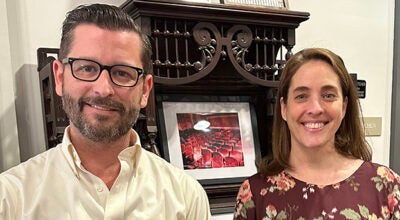Ocean plastics documentary, panel discussion join River Art opening
Published 8:31 pm Wednesday, August 16, 2017

- FEATURED EXHIBIT: Bonnie Monteleone’s research on ocean plastic is featured in “A Plastic Ocean,” which will be screened at the Turnage Theatre on Aug. 31. The showing and panel discussion following are part of the opening reception for Arts of the Pamlico’s River Art exhibit. (Bonnie Monteleone)
The Turnage Theatre will be talking trash on Aug. 31.
The date represents the opening reception of the River Art exhibit, which will now feature a screening of “A Plastic Ocean,” a documentary about the global effects of plastic on both human and marine populations.
The River Art exhibit is a first for Arts of the Pamlico, as the main requirement of artwork is that it’s made of at least 50 percent trash found in or on the shores of the Pamlico River and its tributaries.
The problem with trash in the waterways, leads to trash in the oceans, which made the art exhibit and the film a perfect combination to promote together, said Jennifer Skvarla, acting president of Pamlico-Albemarle Wildlife Conservationists, a branch of the North Carolina Wildlife Federation.
“Right now, we know that our oceans are being inundated with plastic,” Skvarla said. “We look at every little nuance we can to educate the public.”
The exhibit opens at 5:30 p.m. with a reception and live music. At 7:30 p.m., the documentary will be aired, followed by a panel discussion that includes one of the scientists featured in the documentary: Bonnie Monteleone, a researcher at University of North Carolina-Wilmington and executive director for the nonprofit Plastic Ocean Project, Inc.
Monteleone said there are three parts of the film’s message: that ocean plastic is a very serious problem; the average person can participate in lessening the problem; and to figure how ocean trash can be turned into a commodity — Monteleone’s latest project is working with a U.S. company that is turning plastics into fuel, according to a press release.
“I think we take for granted, ‘Yeah, there’s plastic in the ocean, but it’s a big ocean, so it’s not such a problem,’” Monteleone said. “Plastic affects everything, from plankton up to the blue whales, which are the largest animal on the planet, and everything in between.”
She’s seen it for herself. Monteleone has done research at three of the five ocean gyres — systems of circular sea currents that tend to act as trash vortices, collecting marine debris that include masses of plastic in many states of decomposition. The documentary in part follows her field work in the South Pacific gyre and discussion of her findings, one of which was finding plastic in fish that researchers dissected, she said.
Despite the dire subject matter, Monteleone said the film is actually quite beautiful.
“There’s a lot of beautiful parts to it — the marine life. There’s a lot of elegance,” she said. “It’s not all grim.”
As for the trash in the oceans, it’s more than just an eyesore: “It’s important to our health because there are chemicals that leach from plastics that are ending up in our bodies. … Every single one of us needs to see this film just because it’s so relevant.”
“A Plastic Ocean” and the exhibit reception are free and open to the public. The Turnage Theatre is located at 150 W. Main St., Washington.





